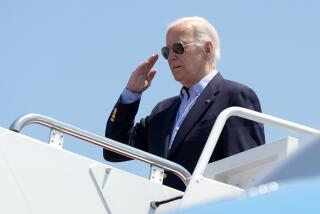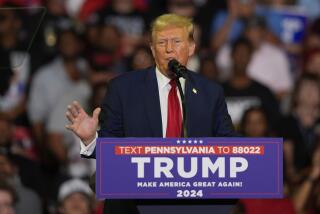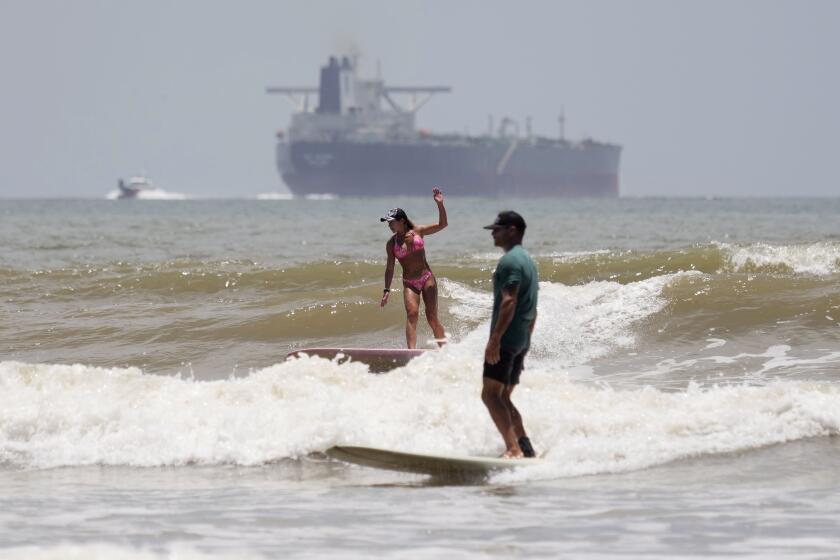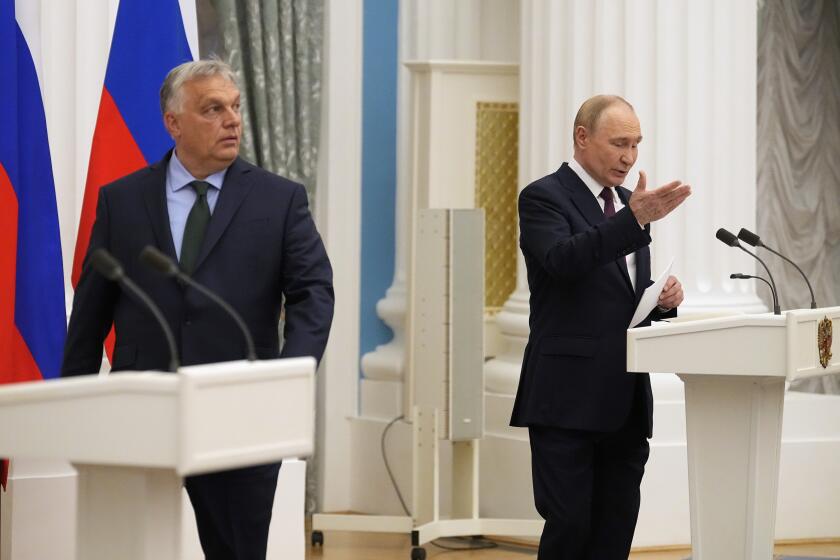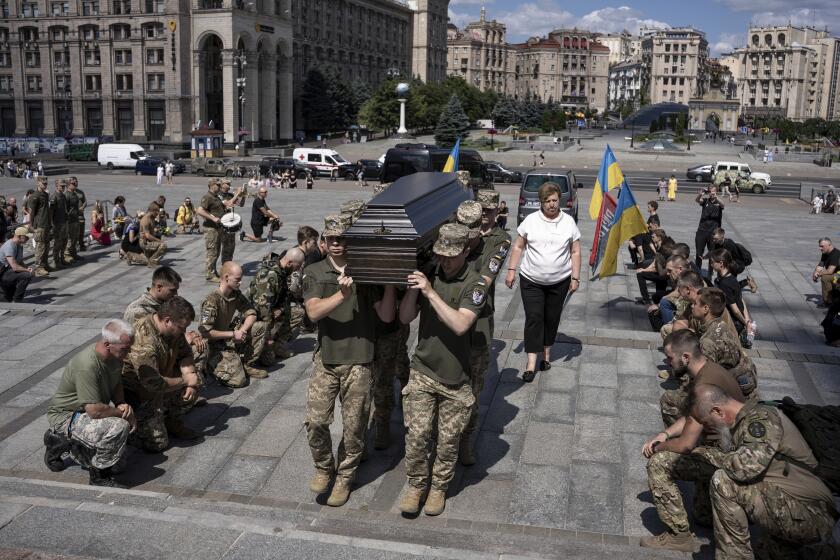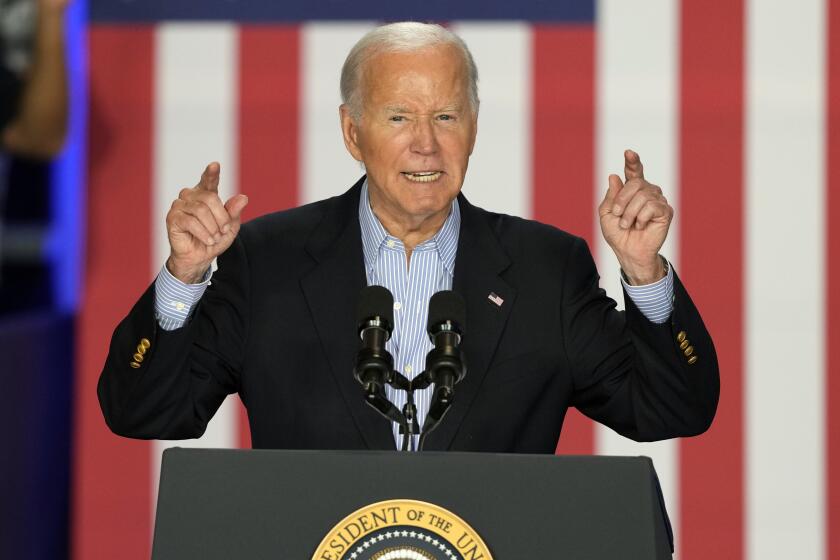The Iran Deception : REAGAN’S GREATEST CRISIS : CHAPTER 3 : Enough to Make a Middleman Smile
After six years of magic, President Reagan broke the spell. By deceiving the nation, he and those around him badly damaged his presidency. This traumatic tale is still unfolding, with no end in sight. This is how it developed.
About 10 days later, presumably oblivious to Buckley’s brutal fate, three businessmen in $600 silk suits were in a festive mood. As their rain-splattered Mercedes-Benz eased away from downtown Hamburg, West Germany, and moved toward rows of waterfront warehouses looming gray and damp along the Elbe, the three shared French champagne and discussed a billion-dollar deal.
After hours of intensive negotiations, participants say, they had left their private meeting place on this gray day in mid-June, 1985, and were going shopping for bargains at an unusual exhibition of Persian carpets. The exquisite rugs, suitable for kings, had once adorned the Shah of Iran’s palace. The story was that some wise generals had saved the priceless antiques from the Khomeini revolution.
The businessmen who stepped from the limousine--careful that their alligator shoes avoid the puddles--appeared to be men of vast substance. Certainly between trips to rug sales and late-night diversions at strip-tease shows, they were discussing the kinds of business deals that can affect the economic health and even the political stability of entire nations.
They were arms merchants, members of a world of immense profits but also endless plots and subplots, deals and double-deals. The international arms bazaar can convene almost anywhere, being a market without borders or ideology, but for the moment it had opened for business in Hamburg.
All the world’s arms merchants recognized Iran as a prize. The Ayatollah, at war with Iraq, lacked spare parts for his vast stocks of American-made weapons. Urgent demand meant high prices and, therefore, high profit opportunities. Throughout four days of meetings from June 14 to 17, their associates say, the three men browsing among the antique carpets discussed formation of an alliance that would involve billions of dollars in new trade with Iran--trade in farm and construction equipment, extensive oil contracts and, of course, weapons and military spare parts.
Each of the three seemed well-chosen to play a role in the proposed enterprise, and two of them at least had their own pressing reasons for wanting to see it flourish.
First, there was Adnan Khashoggi, a Saudi Arabian often described as “the world’s richest man.” He had flown to the meeting in his private jet, attended by an entourage of aides and advisers who were lodged in the finest suites of the opulent Vier Jahreszeiten Hotel. Khashoggi took the penthouse overlooking Alster Lake.
Khashoggi had uncommon access to heads of state and their advisers. He let it be known, for instance, that he had recently met with McFarlane. And it was common knowledge that Khashoggi had access to Peres.
But the true status of Khashoggi’s wealth and influence were uncertain just then. He was late on loan payments for his $50-million yacht, for example; the maids in his penthouse apartment on New York’s 5th Avenue had not been paid for months; he had been embarrassed when a restaurant in Cannes refused to serve dinner to his party until a past-due account was settled.
The second of the three was Cyrus Hashemi, a cherub-cheeked former Iranian banker who normally commuted to his London office in a gold-trimmed Rolls-Royce. He was Khashoggi’s newest partner in a joint venture, called the World Trade Group, that had been negotiated weeks earlier by New York oil consultant Roy M. Furmark, a longtime friend and associate of both Khashoggi and CIA Director William J. Casey. One of World Trade Group’s goals was to sell weapons and spare parts to the Ayatollah.
What Hashemi brought to the partnership was a history of bridging the gap between Washington and Tehran. In 1980, when Iranians had taken the 52 Americans hostage, Hashemi had worked with the Carter Administration to open channels to officials in Tehran. Hashemi also claimed to be a cousin of Rafsanjani, confidant of the Ayatollah and, by 1985, the Speaker of the Iranian Parliament.
But like Khashoggi’s, Hashemi’s financial empire rested on unsettled footings. He faced mounting debts, complicated by major gambling losses at swank London casinos controlled by Roland W. (Tiny) Rowland. He was a fugitive from the United States, where a federal grand jury had indicted him on charges of concealing illegal arms sales to Iran. Already slipping into bankruptcy, Hashemi needed a new connection to lucrative deals with Iran.
The third man was Manucher Ghorbanifar, a Paris-based Iranian businessman who was probably regarded by each of the other two secretly struggling partners as his own angel of opportunity. Khashoggi and Hashemi may already have been silently plotting how to deal directly with Ghorbanifar while cutting each other out. With close ties to high-ranking officials in the Iranian government, including Prime Minister Hussein Moussavi and the Iranian purchasing agents headquartered in Hamburg, Ghorbanifar seemed able to move easily in and out of Iran. And he had shown a surprising knack for playing on both sides of the revolution.
Before 1979, sources say, he was an agent of Savak, the Shah’s secret police, and a partner in Starline Iran, a joint Israeli-Iranian shipping firm that moved oil from Iran to Israel. After Khomeini came to power, Ghorbanifar was linked to an unsuccessful military coup against the Ayatollah and fled the country in 1980. But somehow Ghorbanifar’s relations with the Khomeini regime later became good--so good that some Iranian Air Force officers who plotted the coup now say they are suspicious of his previous loyalty.
At the time of the Hamburg meetings, Ghorbanifar claimed to be head of Iranian intelligence operations in Europe. He had been introduced to Khashoggi and Hashemi by Furmark, Casey’s friend.
The arms dealers, Ghorbanifar later told an interviewer, talked at length about U.S.-Iranian relations. Ghorbanifar said Iran might be willing to warm up relations in return for access to American weapons. Khashoggi had already heard from Israeli arms merchant Nimrodi that the United States was interested in finding an intermediary--Iran seemed a likely candidate--to help free the American hostages in Lebanon.
Anyone could see the opportunity: Two hostile and desperate nations were groping for a way to do business discreetly together. It was enough to make a middleman smile.
At the waterfront warehouse, the men selling the late Shah’s rugs smiled, too--and waited patiently for these wealthy men to make an offer. Finally, only Khashoggi made a purchase--buying two pieces the size of bath mats. It was a disappointing day at the rug sale, but the arms bazaar was still open.
Not long after the Hamburg meeting, Khashoggi and Hashemi flew to Israel. Outside of the United States, Israel controlled the largest stockpile of American-made weapons and spare parts in the world. The arms merchants met with Peres, though details of what was said are unknown.
That was as far as it all went for Hashemi; soon afterward Khashoggi somehow maneuvered him aside. But by the end of August, 1985, Khashoggi and Ghorbanifar had brokered an initial Israeli shipment of U.S. anti-tank missiles, called TOWs, for Iran.
Fateful as that August shipment would become for the leaders of the United States and Israel, it did not get in Khashoggi’s way when it came to throwing a party in late July: He marked his 50th birthday with a weeklong soiree at an estate in Marbella, Spain. According to people who attended, more than 500 guests were flown in from around the world and the costs--as high as $5 million by some estimates--were applied to Khashoggi’s charge accounts with airlines, hotels and restaurants. Actress Brooke Shields was there with her mother. And Maxwell Rabb, the U.S. ambassador to Rome. And Saudi sheiks. German industrialists.
The final dinner included a troupe of British actors--horse-mounted knights in full armor, big-bosomed wenches and “King Henry VIII” himself. At the appointed hour, “King Henry” announced that he was abdicating; Khashoggi was escorted to a throne amid great pomp.
More important to the man on his way to the throne was his still-secret blessing from the White House. For, unlike any business rival in the arms bazaar, Khashoggi had sewn up an official U.S. arms account with Iran.
It was enough to make “King Adnan” grin.
More to Read
Start your day right
Sign up for Essential California for news, features and recommendations from the L.A. Times and beyond in your inbox six days a week.
You may occasionally receive promotional content from the Los Angeles Times.
